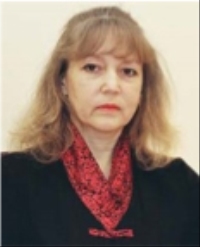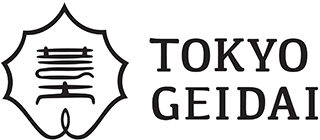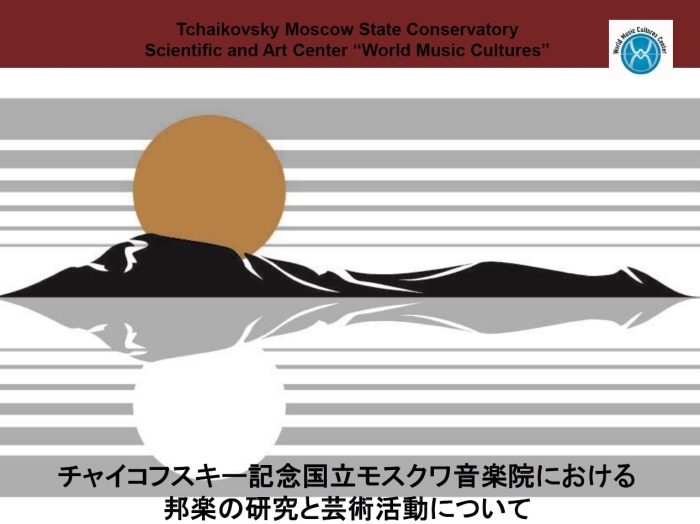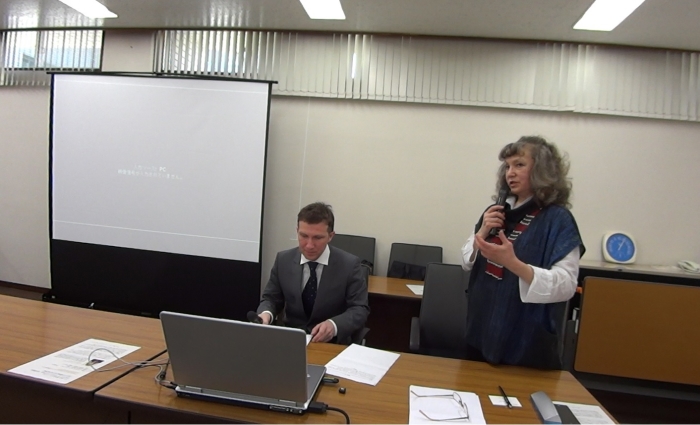マルガリータ・カラトゥイギナ先生講演会「モスクワ音楽院における日本音楽」A Lecture in Japan by Dr. Margarita Ivanovna Karatygina
May 26, 2015
はじめに
東京藝術大学音楽学部、音楽創造・研究センターの主催で、モスクワ音楽院世界音楽文化センター、センター長であるマルガリータ・カラトゥイギナ先生により、モスクワ音楽院およびロシアにおける日本音楽の受容状況についての講演が3月26日に行われました。
講師紹介
マルガリータ・イヴァーノヴナ・カラトゥイギナ(Margarita Ivanovna Karatygina)

モスクワ音楽院世界音楽文化センター、センター長。音楽学博士。自身も生田流筝曲師範の免状を持ち、同センターで箏と三味線の指導にあたる。また邦楽アンサンブル「Wa-on」を結成し、演奏活動も行っている。これまでに同センター主催による《夕顔》、《岐阜からの帰還》、《一輪の花》、《春の海》、《お夏》などの音楽舞台公演を監督したほか、数々の日本音楽関連企画を主宰。日露交流プロジェクトの学術アドバイザーも務める。日本音楽以外でも、イラン、インド、中国、アラブ音楽の音楽祭、伝統楽器による数多くの演奏会を開催している。
参考:モスクワ音楽院世界音楽文化センターWebサイト
講演概要
モスクワ音楽院において日本音楽が広がった背景として、1970年代半ばに同音楽院教授で作曲家・音楽学者のミハイロフ・ジヴァーニ・コンスタンティーノヴィチ氏が、多様な地域の音楽文化についての講義を行ったことが挙げられます。その後、教え子らにより「国際音楽文化センター」が設立され、各国から著名な演奏家を招聘し、演奏会が開催されるようになりました。
1993年には、沢井忠夫箏曲院の指導者で著名な演奏家である岩堀敬子氏の指導グループにより演奏会が行われ、その後、モスクワ音楽院の学生たちの強い希望により初の邦楽の授業が開講され、それが好評を得たことにより、日本音楽のマスタークラスが毎年開かれるようになりました。
また、その3年後には、尺八演奏家の清水浩平氏(当時JALモスクワ支社所長)を琴研究科・尺八クラスの指導員として迎えることとなり、清水氏は現在も講師として活動しています。1996年にはロシア初の邦楽アンサンブル「Wa-on和音」が誕生しました。現在でもロシア唯一の邦楽アンサンブルであり、モスクワ市内の様々なホールで活動しています。
そして、ロシアでの日本文化への急速な関心の高まりと重なるように、より多くの専門的な研究機会の需要が強まり、1999年に第1回音楽祭「日本の心」が開催される運びとなりました。この音楽祭には、邦楽の個人演奏家・演奏団体のほかにも、様々な日本文化を伝える演奏者が出演しています。次第に芝居や演劇も上演されるようになり、16年目である2014年には、大人から子どもまで約2,000人が参加するほどの大きな行事となっています。
現在では、ロシア人の邦楽に対する関心・理解が一般の方の間でも広がりを見せており、研究希望者からは、日本人による母国の音楽文化についての講義を求める声が強まっています。これは、西洋化された日本文化には期待せず、伝統的なものを学びたいという姿勢の表れともいえます。
備考
講演会の詳細な内容は、本学・音楽創造・研究センターのWebサイトでご覧いただけます。
On March 26, 2015, Center for Music Creativity and Advanced Research, Faculty of Music, Tokyo University of the Arts, hosted a lecture by Dr. Margarita Karatygina, who talked on Moscow Conservatory and how traditional Japanese music has been accepted at her institute.
Profile of Dr. Karatygina
A musicologist and Head of Scientific and Art Center “World Music Cultures” at Moscow Conservatory. Dr. Karatygina, who is a qualified koto instructor of Ikuta-School, teaches koto and shamisen at Center. She is also engaged in performance at her Japanese music ensemble Wa-On. She has directed various concerts for Center titled Yugao, Gifu-kara-no-kikan, Ichirin-no-hana and Onatsu, and has led a number of traditional Japanese music related projects. While serving as academic adviser for Japan-Russia exchange programs, her activities are not limited to traditional Japanese music. She has organized numerous concerts of other traditional music instruments and ethnic music festivals such as Iranian, Indian, Chinese and Arabian music.
http://www.worldmusiccenter.ru/members/karatygina
Summary
In the mid-70s, Mikhailov Ghivani Konstantinovich, who was a composer, musicologist and professor of Moscow Tchaikovsky Conservatory, held a series of lectures on music cultures of different regions, which contributed to the spread of traditional Japanese music at Conservatory. Later, Scientific and Art Center “World Music Cultures” was established by his students and other collaborators, which, up to present, has invited world renowned performers to host concerts.
In 1993, a group of Keiko Iwahori, who is an esteemed koto player and an instructor at Sawai Tadao Koto Institute, held a concert at Conservatory. Subsequently, a class of traditional Japanese music was held for the first time at the strong request of the students. A favorable reputation of the class saw the opening of a master class, which still continues to be held every year.
Three years later, shakuhachi flute player Kohei Shimizu, who is currently teaching at Conservatory, but then was the head of Japan Airlines Moscow Office, joined Conservatory. In 1996, the first traditional Japanese music ensemble in Russia was born. Wa-On, which was established by Dr. Karatygina, is even now the only ensemble of the kind in the country and it performs in various halls in Moscow.
The increase in demand for more specialized research opportunities overlapped with growing interest in the Japanese culture among Russian people, which bore fruit in the form of the first Nihon-no-Kokoro music festival in 1999. This festival invites not only individuals and groups of traditional Japanese music players but also performers from different fields in the Japanese culture. More theatrical plays and dramas have been staged, and in 2014, which marked the 16th anniversary, the festival became so major as to attract approximately 2000 people from adults to children.
At present in Russia, people are generally more interested in and have developed the understanding of traditional Japanese music. Those wishing to conduct research have increasingly started to call for lectures on music culture in Japan by Japanese lecturers. It is an indication that people are willing to learn the traditional side of the Japanese culture rather than its westernized aspects.





